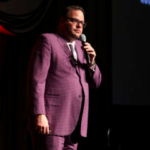Speaker selection is a make-or-break decision. Get it right and an outstanding speaker will enhance the entire event experience. Get it wrong and audience engagement will dip. How does your organization get ideas for new professional speakers?
In survey after survey, conference organizers reveal that their No.1 source for finding new professional speakers is word of mouth (WOM). This WOM channel includes recommendations from peers, members, and staff. Other frequently tapped resources include speaker bureaus and recommendations from service providers. These trusted specialists know the speaker landscape well and can recommend professional speakers who will align their presentation closely with your conference objectives.
Still, fees for choice speakers can run high. Given today’s economy, many conference organizers are keeping a watchful eye on costs. Here’s one alternative to high-priced speakers.
Go local
Once you’ve booked your conference destination, zoom in on the local scene to scout out emerging talent. In most major markets, there’s often a wealth of speakers who can delight audiences – and at more budget-friendly rates. Professional speakers will often cut their fee by as much as 50 percent for a gig that doesn’t require travel and an overnight stay. Here are a few ways you might not have considered to search for local speakers:
- TED is the gold standard for speaker excellence. Since 1984, TED (Technology, Entertainment, Design) has been hosting conferences where the best and brightest share “Ideas Worth Spreading.” TED talks run 18 minutes or less – but don’t let the short length fool you. It takes far more preparation to inspire an audience in 18 minutes than in 60. In recent years, TED talks have been archived online at ted.com (also available via mobile App) for all to enjoy. TED is where you’ll find some of the major-league players whose fees typically run at the top of the pay scale. Then there’s TEDx, designed to help communities, organizations, and individuals spark innovation chats at the local level. Think of TEDx as the local farm system where emerging speaker talent can be found – and dig into the TEDx community near your venue for some promising leads.
- LinkedIn can yield better results than Google searches for speakers, especially when you’re looking within a defined geographic region. In LinkedIn, go to the People/Advanced Search page, enter keywords that relate to your desired topic, and add “speaker” to your keyword string. Key in the postal code where your meeting will take place and click “Submit” for a list of results within 100 miles or so. At the bottom of the search query page, select “Expanded” from the “Views” dropdown menu. Keep in mind that search results run three degrees deep. If you’re light on contacts, you’ll want to work on improving that first.
Locally Sourced
Local referral sources, including the area CVB, should be excellent places to start in your hunt for experts in your meeting destination. Also, many cities have social-media clubs, where you can find up-and-coming speakers for emerging and high-tech topics. And consider checking the National Speakers Association chapter directory or reach out to the chapter president for referrals.
More Resources
Business Aloha is an example of one CVB’s “go local” initiative. See how Business Aloha helps planners find local speaker talent at convn.org/speaker-aloha.



